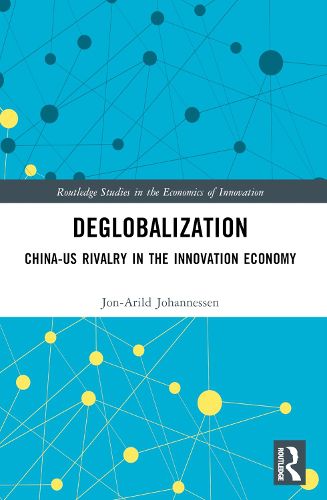Readings Newsletter
Become a Readings Member to make your shopping experience even easier.
Sign in or sign up for free!
You’re not far away from qualifying for FREE standard shipping within Australia
You’ve qualified for FREE standard shipping within Australia
The cart is loading…






The emerging conflict between the US and China has an inherent tendency towards a development of deglobalization. It is the historical prerequisites for this deglobalization that are examined in this book. These assumptions are largely based on what is termed the second wave of globalization, based on increasing technological competition between the US and China, as well as China's expansion along the New Silk Road.
In this book, the author makes a distinction between the Old Globalization and the New Globalization. The Old Globalization was characterized by competition over costs in general and wage costs in particular, while the New Globalization is categorized by new competencies and skills, especially technological capabilities and technological innovations. The second wave, which is driven by technological innovations, lays the foundation for a counter-strategy on the part of the US to stem the Chinese technological expansion. It is this new strategy that confines the second wave of globalization from China and lays the foundation for deglobalization.
The book analyses US-China relations from a fresh perspective, namely a systemic thinking approach. The focus is the emerging innovation economy, which leads to tension and deglobalization. The book is grounded in evolutionary economics and uses conceptual generalization in its descriptions, analysis, theoretical reflections, and real-world cases.
The key message is that the economy of the future will be characterized by coordinated wave movements: economic growth mainly controlled by private capital alternating with economic downturns that necessitate collective solutions and government interventions.The book offers policy suggestions, which include promoting effective macroeconomic policies, and extending microeconomic cooperation schemes, related to the innovation economy.
$9.00 standard shipping within Australia
FREE standard shipping within Australia for orders over $100.00
Express & International shipping calculated at checkout
Stock availability can be subject to change without notice. We recommend calling the shop or contacting our online team to check availability of low stock items. Please see our Shopping Online page for more details.
The emerging conflict between the US and China has an inherent tendency towards a development of deglobalization. It is the historical prerequisites for this deglobalization that are examined in this book. These assumptions are largely based on what is termed the second wave of globalization, based on increasing technological competition between the US and China, as well as China's expansion along the New Silk Road.
In this book, the author makes a distinction between the Old Globalization and the New Globalization. The Old Globalization was characterized by competition over costs in general and wage costs in particular, while the New Globalization is categorized by new competencies and skills, especially technological capabilities and technological innovations. The second wave, which is driven by technological innovations, lays the foundation for a counter-strategy on the part of the US to stem the Chinese technological expansion. It is this new strategy that confines the second wave of globalization from China and lays the foundation for deglobalization.
The book analyses US-China relations from a fresh perspective, namely a systemic thinking approach. The focus is the emerging innovation economy, which leads to tension and deglobalization. The book is grounded in evolutionary economics and uses conceptual generalization in its descriptions, analysis, theoretical reflections, and real-world cases.
The key message is that the economy of the future will be characterized by coordinated wave movements: economic growth mainly controlled by private capital alternating with economic downturns that necessitate collective solutions and government interventions.The book offers policy suggestions, which include promoting effective macroeconomic policies, and extending microeconomic cooperation schemes, related to the innovation economy.